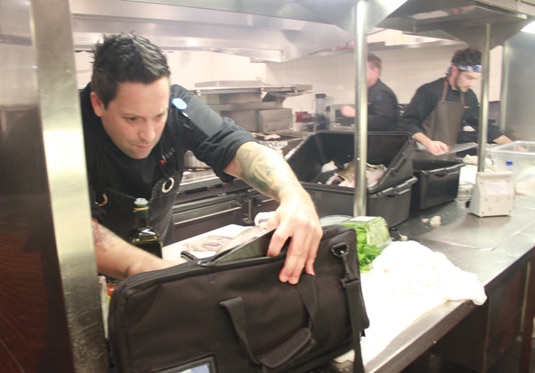
Create a free profile to get unlimited access to exclusive videos, sweepstakes, and more!
The Best Restaurant Won
Eli Kirshtein lauds Le Bernardin, and explains why Bodega came out on top.

On hallowed ground they walk. The importance and significance of Le Bernardin can in no way be overstated. Having originally opened as a fish restaurant in Paris in 1972 and then relocating to New York City in 1987 under the direction of the brother-sister team of Gilbert and Maguy Le Coze, it has never relented on its standard for a moment. Our esteemed friend of Top Chef, Eric Ripert joined the team in 1991 and after an untimely death of Gilbert in 1994, became the chef/partner. In its very first review from The New York Times it received a four-star rating which it has yet to give up, making it the longest standing holder of the paper's top culinary accolade. The restaurant has earned six James Beard awards under its roof and in 2006 it earned a Michelin three-star rating to boot. One of the most significant things about what the restaurant has achieved is that it has been able to ebb and flow without changing its core principles at any point. Very few restaurants anywhere in the world can have the longevity, nonetheless with this level of quality, that Le Bernardin has had. It has become a gastronomic palace and a pivotal reference point for fine dining service. Many would argue that it is the greatest seafood restaurant in the world.
With all that being said, prepping and then cooking fish in this storied place must be unnerving to say the least. None of the rhetoric that Bourdain was saying of Justo Thomas is an exaggeration either. So having to butcher under his watchful eye is an even greater layer of stress. Some of the chefs knew they were out of their element, and it takes a pretty huge amount of humility to be as genteel about it as they were. The chefs who did well really knew their way around a fish, and all did dishes that were respectable as well as appropriate for the challenge.
Amongst Top Chef contestants there has long been a dispute about which you are actually cooking for. Some will say that it is the guests who are being fed during the challenges; others will say it is the judges. I know what a lot of you will say, but they are not even close to the same thing. If I had a dime for every time I heard a chef who was on the bottom or even went home say that all of the guests said theirs was the favorite, while the eventual winners was repulsive, I would be rich man. Unfortunately there is a major disconnect between these two camps often times. A chef on the show has done a transcending job when they appease both groups, but it is rare, much rarer than the edit of the show might tell you.
That’s why it was very exciting to see the active decision to let the guests pick the better of the two restaurants. It seemed by the landslide nature of the tally as well as the judges', and the much-loved Food & Wine editor-in-chief Dana Cowin’s opinion, that it was so black and white that it was a moot point. It was interesting to see the two different styles of restaurants; one was more of a “concept” while the other focused on being just a refined restaurant. It seemed one of the biggest advantages was the wit and tact that the whole team at Bodega had. I think the best restaurant did win on this day.
Follow me on Twitter at www.twitter.com/elikirshtein














